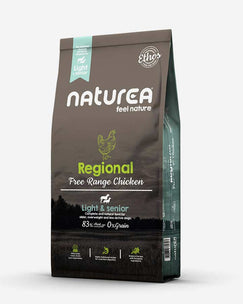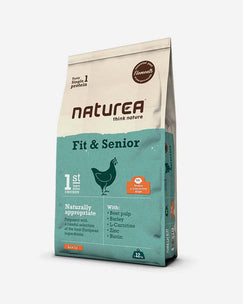Senior dog food
As your dog ages, typically around 5-7 years old, their dietary requirements undergo adjustments. This transition encompasses a reduction in fat intake to prevent weight gain, given the metabolic changes that accompany aging. Additionally, an increased intake of fiber is necessary to promote satiety and facilitate digestion, which can become somewhat challenging for older dogs. With age, dogs tend to be less active, and their musculoskeletal system may experience heightened wear. Consequently, maintaining a stable weight becomes vital to alleviate strain on their joints, ensuring they aren't burdened by excessive body weight.
Keep your dog slim
Excess weight isn't advantageous for either humans or animals, which underscores the importance of moderating fat content in your dog's senior food. With advancing age, a dog's metabolic rate decreases, rendering weight loss more challenging. Simultaneously, it becomes easier for them to gain weight. Moreover, older dogs typically exhibit lower energy levels and reduced activity compared to their younger counterparts. Consequently, providing the appropriate diet is crucial for aging dogs. Excessive weight doesn't only place strain on the dog's joints but also impacts vital systems including respiration, blood circulation, and internal organs.
What does food mean for the body?
As explained earlier, a controlled fat intake corresponds to a decreased risk of overweight concerns. Additionally, an elevated fiber content promotes improved digestion and heightened satiety levels. Senior food containing easily digestible proteins results in fewer waste byproducts within the dog's system, thereby minimizing the strain on the liver and kidneys—organs responsible for expelling waste from the body. Abundant omega fatty acids enhance the immune system's strength and mitigate the likelihood of skin issues. The inclusion of glucosamine facilitates joint lubrication and supports the development of robust joint cartilage. Restricting salt intake is also pivotal for older dogs, as it curtails the potential for heart and circulatory complications. Multiple factors influence your dog's diet from puppyhood to their senior years, emphasizing the importance of not maintaining the same diet throughout their entire life span.












